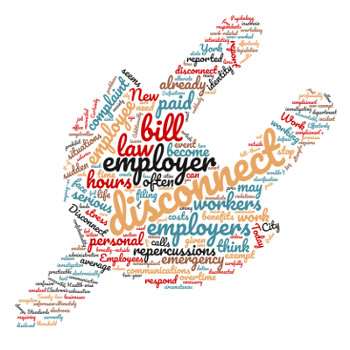 A bill currently pending in New York City Council would prohibit employers from requiring their employees to respond to work-related electronic communications outside the employees’ standard working hours.
A bill currently pending in New York City Council would prohibit employers from requiring their employees to respond to work-related electronic communications outside the employees’ standard working hours.
Proposed in an effort to relieve over-worked employees who may face repercussions if not accessible around the clock, this bill aims to allow workers to disconnect their job from their personal lives. “Electronic communications” are defined broadly—outside of work hours, employees will be free of email, text, or “other digital means of conveying data electronically.”
Effectively, the legislation would put into law the “right to disconnect,” adding a section in the administrative code entitled “Disconnect from Work.” New York City seems to need the relief: a 2015 report by the city comptroller showed that the average New Yorker works 49 hours and 8 minutes a week, which is longer than the average resident in each of the next 29 largest cities in the United States.
Certainly, it can be intimidating for an employee to lodge a complaint against their employer. To alleviate that concern, the bill professedly values confidentiality of the complainant’s identity. Additionally, the employee is given a two-year window after an alleged incident to report it.
As per the statute, the identity of the employee filing a complaint wouldn’t be disclosed unless the law or the investigation requires it—if it does ultimately become necessary, the department investigating would notify the complainant “to the extent practicable,” a phrase which is not given any further clarification.
The amendment does provide an exception for emergency situations, or, as the bill defines it, “a sudden and serious event, or an unforeseen change in circumstances, that calls for immediate action to avert, control or remedy harm.” The law also exempts businesses with less than 10 employees.
The bill attempts to limit the scope of the working day and protect workers from the exhaustion and stress of work life overtaking personal life. Today is an age of constant communication, and while not all situations may be deemed serious, things happen suddenly a lot more often than they used to. This promises to create much confusion over just what an emergency is: when does an event become “sudden and serious” enough? Definitions are sure to differ from employer to employer, not to mention from employer to employee.
There are many workers who think that their employers would probably be noncompliant. Twenty-two percent of respondents to an Office Pulse Survey reported that they did not think it would stop their boss from expecting them to respond. If this does indeed occur, whether or not the employers will face repercussions for it is up to the employees.
Employees will have to judge the pros and cons of filing a complaint: will the benefits of holding their employer accountable outweigh the costs? Health-wise, the answer seems to be yes. People who fail to take vacation time or personal time disconnected from the office can become burnt out which often leads to medical problems. Psychology Today reported that burnout, or a state of “chronic stress,” results in symptoms such as insomnia, chest pain, and anxiety, among other mental and physical issues.
Just as employees will have to consider these costs and benefits, employers will be making judgment calls often, too, which is part of the intent of the bill—those who care about the repercussions of the law, which includes fines up to $1,000 in the case of successive violations, will have to think twice and carefully decide what warrants an emergency.
As an article in HR Dive pointed out, some workers are already effectively paid for overtime, and this bill may stop employers from getting from their employees what they’ve already paid for. The law would apply to exempt and non-exempt employees alike. Employees are “exempt” when their salaries and duties meet a threshold set by the Fair Labor Standards Act, and they are not required to be paid for overtime work because they are already paid for all the hours an employer will need them, anyway—so, how these two laws will be reconciled, if at all, is unclear.
Sources:
Text of the Proposed Amendment and Bill:
http://legistar.council.nyc.gov/LegislationDetail.aspx?ID=3458217&GUID=8930D471-5788-4AF4-B960-54620B2535F7
Should Employees Have a Right to Disconnect:
https://www.hrdive.com/news/should-employees-have-a-right-to-disconnect/524416/
NYC Considers a Right to Disconnect:
https://www.hrdive.com/news/nyc-considers-a-right-to-disconnect-but-employees-arent-sure-it-will-he/521797/
Office Pulse Survey:
http://officepulse.captivate.com/responding-to-emails-after-work
The Tell-Tale Signs of Burnout: Do you Have Them?
https://www.psychologytoday.com/us/blog/high-octane-women/201311/the-tell-tale-signs-burnout-do-you-have-them
NYC Comptroller Study:
https://comptroller.nyc.gov/wp-content/uploads/documents/Longest_Work_Weeks_March_2015.pdf